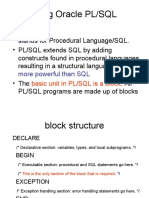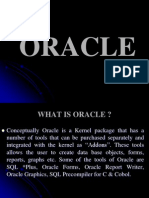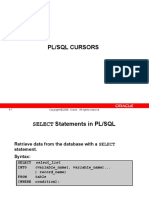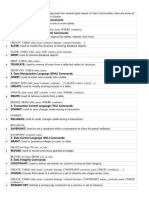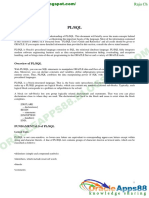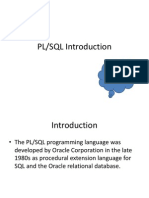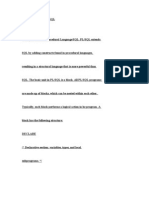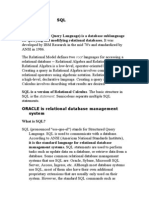SQL Cheatsheet: Icbc Road Test
Uploaded by
sandanuwanSQL Cheatsheet: Icbc Road Test
Uploaded by
sandanuwanSQL Cheatsheet
KEY
---
Curly braces group alternatives together,
and alternatives are separated by pipes: {this | that | t'other}
Clauses in brackets are optional: You [and john] can come.
An asterisk indicates 0 or more instances: I like to eat[ and eat]*.
A plus-sign indicates 1 or more instances: Run fast,[ go]+!
A plus-sign also indicates addition: select (1 + 3) from dual;
Elements are defined in terms of other elements.
<number> : [0-9]+ means that a number is composed of one or more digits.
<datatype>: {integer | char(<number>) | varchar2(<number>) | date}
means that a <datatype> element is one of the four strings shown.
<column-set>: <column> = <expression>
means that a <column-set> element is composed of a <column>, followed by
an equals sign and an <expression>.
Readability of PL/SQL is much improved by highlighting certain keywords;
this is why some word are in all caps. icbc road test ---
INSERTS and UPDATES
-------------------
<insert>: insert into <tablename> [<columns>] {values <values> | <select>}
<select>: select [distinct] <columns> from <tables> [<where>] [group-by]
<select-union>: <select> union <select> [<order-by>]
<select-order>: <select> <order-by>
<update> : update <tablename> set <column-set> [, <column-set>] [<where>]
<column-set>: <column> = <expression>
<update-from-query>: update <tablename> set <columns> = <select> [<where>]
FUNDAMENTALS
------------
<name> : [a-zA-Z][a-zA-Z0-9_]* - that is, a string of alphanumeric chars
and underscores starting with an alpha
char.
<number> : [0-9]+
<datatype>: {integer | char(<number>) | varchar2(<number>) | date}
<ora-alias>: a temporary nickname for a table or column, for the purposes
of condensing a query.
LITERALS
--------
<value> : {<number> | <string> | <number-expr> | <string-expr>}
<values> : ( <value> [, <value>]* )
<number-expr>: {<number> | <column-name>} + [<number> | <column-name>]*
<string-expr>: {<string> | <column-name>} || [<string> | <column-name>]*
NAMES and DEFINITIONS
---------------------
<column-name>: name of a column in a table in the current scope
<columns> : ( <column-name> <ora-alias> [, <column-name> <ora-alias>]* )
<new-column> : <name> <column-def>
<new-columns>: <new-column> [, <new-column>]*
<column-def> : <datatype> [default <value>] [<constraint>]*
<table-name> : name of a table in the current scope
<tables> : <table-name> <ora-alias> [, <table-name> <ora-alias>]*
<constraint> : {not null | primary key | references <table-name>}
CREATION
--------
<create-table-new> : create table <name> ( <new-columns> )
<create-table-from>: create table <name> as <select>
<create-tablespace>: create tablespace <name> datafile '<filespec>'
size 50m autoextend on default storage (pctincrease 1);
<filespec> : /opt/ora8/m02/oradata/ora8/<name>01.dbf
<create-user> : create user <name> identified by <db-password>
default tablespace <name> temporary tablespace temp quota
unlimited on <name>;
<grant-user> : grant connect, resource, ctxapp to <name>;
grant javasyspriv to <name>;
ADDING, DROPPING, AND DELETION
------------------------------
<add-column> : alter table <table-name> add ( <new-columns> )
<drop-column>: alter table <table-name> drop column <column-name>
<drop> : drop {table|view|sequence|function} <name>
<delete>: delete from <table-name> [<where>]
PL-SQL BASICS
-------------
<var-name> : A variable passed into a function, or definied in <declarations>
<argument> : <name> IN <datatype>
<arguments>: <argument> [, <argument>]*
<args> : <value> [, <value>]*
PL-SQL
------
<create-function>: create or replace function <name> ( <arguments> )
return <datatype> AS [<declarations>] BEGIN <function-body> END;
<declarations> : <name> <datatype>[:= <value>];
<function-body>: [{<statement> | <loop>};]*
return {<var-name> | <value>};
<statement>: { <var-name> := {<expression> | <function>} |
open cursor <cursor-name> |
fetch <cursor-name> into <var-name>} |
<loop> : LOOP [{<statement> | <loop>};]*
exit when <condition>
END LOOP;
<ora-call-function>: select <name>(<args>) from dual;
You might also like
- ICML MLT I - Body of Knowledge and Domain of KnowledgeNo ratings yetICML MLT I - Body of Knowledge and Domain of Knowledge3 pages
- 3.3.3.3 Packet Tracer 7 - Explore A NetworkNo ratings yet3.3.3.3 Packet Tracer 7 - Explore A Network3 pages
- Using Oracle PL/SQL: More Powerful Than SQLNo ratings yetUsing Oracle PL/SQL: More Powerful Than SQL30 pages
- Oracle SQL & PL/SQL Training: Click To Edit Master Subtitle StyleNo ratings yetOracle SQL & PL/SQL Training: Click To Edit Master Subtitle Style99 pages
- Oracle 8i and 9i PL-SQL Collections and RecordsNo ratings yetOracle 8i and 9i PL-SQL Collections and Records25 pages
- Subject Name:oracle Part: PLSQL:: Chapter OneNo ratings yetSubject Name:oracle Part: PLSQL:: Chapter One12 pages
- Working With Composite Data Types: L/O/G/ONo ratings yetWorking With Composite Data Types: L/O/G/O67 pages
- Introduction To Databases: Name: Akanksha SharmaNo ratings yetIntroduction To Databases: Name: Akanksha Sharma52 pages
- Presented By: Dr. Michel Mitri James Madison UniverisityNo ratings yetPresented By: Dr. Michel Mitri James Madison Univerisity127 pages
- What Is Sql ?: Fundamentals of Sql,T-Sql,Pl/Sql and Datawarehousing.From EverandWhat Is Sql ?: Fundamentals of Sql,T-Sql,Pl/Sql and Datawarehousing.No ratings yet
- Duke’s Tips For Finding Functions in Excel: Version 2007 and LaterFrom EverandDuke’s Tips For Finding Functions in Excel: Version 2007 and LaterNo ratings yet
- Advanced SAS Interview Questions You'll Most Likely Be AskedFrom EverandAdvanced SAS Interview Questions You'll Most Likely Be AskedNo ratings yet
- Polaris Sportsman 500 Starter - Wiring Diagram Collection - Polaris Ranger, Polaris RZR, Polaris AtvNo ratings yetPolaris Sportsman 500 Starter - Wiring Diagram Collection - Polaris Ranger, Polaris RZR, Polaris Atv1 page
- Science & Technology Development Fund: STDF Funding MechanismsNo ratings yetScience & Technology Development Fund: STDF Funding Mechanisms23 pages
- Conventional CMOS Latches and Flip Flops, Pulsed Latches, Resettable and Enabled Latches and Flip FlopsNo ratings yetConventional CMOS Latches and Flip Flops, Pulsed Latches, Resettable and Enabled Latches and Flip Flops52 pages
- XP Series Interface Specifications: Revision: 1.3100% (1)XP Series Interface Specifications: Revision: 1.341 pages
- Scribleindia CS2063 Grid Computing Question BankNo ratings yetScribleindia CS2063 Grid Computing Question Bank8 pages
- Time Division Multiplexing (Transmitter, Receiver, Commutator)No ratings yetTime Division Multiplexing (Transmitter, Receiver, Commutator)27 pages
- Cordex 220-4.4kW Modular Switched Mode RectifierNo ratings yetCordex 220-4.4kW Modular Switched Mode Rectifier36 pages
- Power Over Ethernet - Wikipedia, The Free EncyclopediaNo ratings yetPower Over Ethernet - Wikipedia, The Free Encyclopedia7 pages
- S V Polytechnic College, Bhopal (M.P.) : Major Project Report ONNo ratings yetS V Polytechnic College, Bhopal (M.P.) : Major Project Report ON42 pages
- A Comprehensive Guide To Create Blockchain in Python: Blockchain-Rising Development TrendNo ratings yetA Comprehensive Guide To Create Blockchain in Python: Blockchain-Rising Development Trend6 pages
- Speed Detection of Moving Vehicle Using Speed CamerasNo ratings yetSpeed Detection of Moving Vehicle Using Speed Cameras22 pages
- ENGL 111 - Introduction To DocumentationNo ratings yetENGL 111 - Introduction To Documentation9 pages
- Raspberry Pi For Complete Beginners First Edition PDFNo ratings yetRaspberry Pi For Complete Beginners First Edition PDF97 pages
- Internship Presentation: "Industrialtraining O N S Olar Panel at Bhel (Epd) "No ratings yetInternship Presentation: "Industrialtraining O N S Olar Panel at Bhel (Epd) "14 pages










